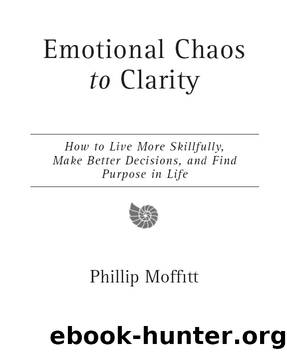Emotional Chaos to Clarity by Phillip Moffitt

Author:Phillip Moffitt
Language: eng
Format: epub
Publisher: Hay House, Inc.
Published: 2012-06-07T16:00:00+00:00
Counting Your Blessings
There are numerous ways to use mindfulness to cultivate gratitude. Of course you acknowledge your appreciation when things are going well. But even more helpful is to notice those things for which you are grateful when you find yourself in a contracted physical or emotional state. I often instruct students to respond to a difficult situation by acknowledging it as such and then saying to themselves, “Yes, this is terrible, and I am grateful for…” For example, “I am angry at life’s unfairness, and I am grateful I have a mind that knows this is so and can deal with it.” Or “My back is killing me, and the sky is an incredible shade of blue today.” I also encourage students to focus on the wonderment of nature and the human capacity for learning and creating.
It is so easy to become compulsively fixated on the terrible and tragic aspects of human life that you can forget that you ever had feelings of gratitude in the past. If you are prone to this kind of pessimistic view, I suggest you reflect on gratitude by inquiring whether it is time based. Ask yourself what has happened to all the gratitude you felt in the past. Where did it go? Do you believe that gratitude is dependent on feeling good right now? If so, isn’t that a very small-minded, “what have you done for me lately” attitude? Doesn’t it imply that your gratitude is contingent upon an exchange—as long as you feel good, you will be grateful, and if not, forget it?
You can also practice being consciously grateful to your family, friends, teachers, benefactors, and all of those who have come before you and have made it possible for your existence to be comfortable, informed, and empowered. Take a few minutes at the end of each day to mentally note the many people who have invisibly served you by providing medicine, shelter, safety, food, and education. You can appreciate all that you have received, even if it was given under less-than-ideal circumstances.
One Life Balance client, Russell, had been traumatized by his mother’s behavior toward him when he was a child. When he told me his story, I understood why, despite lots of psychotherapy, it was still a dominant force shaping his life in middle age. During a meditation retreat, I introduced Russell to the practice of cultivating gratitude toward his mother. First I had him acknowledge all the vital support he had received from his mother, such as food, shelter, and socialization. Then I had him reflect on how fortunate he was to have been born in the first place, to have been born physically healthy, and to have been blessed with a good mind. Later, during a Life Balance session, he reported that he could now see his childhood from two perspectives and thus appreciate it in a new and more balanced way: Even though his mother had acted in ways that were abusive and even illegal, he was grateful that she had given birth to him and that she had blessed him with many good things.
Download
This site does not store any files on its server. We only index and link to content provided by other sites. Please contact the content providers to delete copyright contents if any and email us, we'll remove relevant links or contents immediately.
The Compound Effect by Darren Hardy(8922)
Wonder by R.J. Palacio(8569)
Atomic Habits: Tiny Changes, Remarkable Results by James Clear(8319)
Becoming Supernatural by Dr. Joe Dispenza(8196)
Wonder by R. J. Palacio(8097)
Change Your Questions, Change Your Life by Marilee Adams(7734)
The Road Less Traveled by M. Scott Peck(7591)
Born to Run: by Christopher McDougall(7120)
Daring Greatly by Brene Brown(6501)
Big Magic: Creative Living Beyond Fear by Elizabeth Gilbert(5752)
Grit by Angela Duckworth(5598)
The Slight Edge by Jeff Olson(5408)
Men In Love by Nancy Friday(5231)
The Wisdom of Sundays by Oprah Winfrey(5146)
You Are a Badass at Making Money by Jen Sincero(4913)
Fear by Osho(4727)
The Miracle Morning by Hal Elrod(4710)
The Four Tendencies by Gretchen Rubin(4594)
Rising Strong by Brene Brown(4448)
